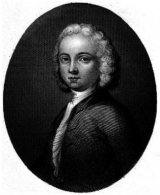Analysis of Ode to Fear
William Taylor Collins 1721 (Sussex) – 1759 (Sussex)
Thou, to whom the world unknown
With all its shadowy shapes, is shown;
Who seest, appalled, the unreal scene,
While fancy lifts the veil between:
Ah fear! ah frantic fear!
I see, I see thee near.
I know thy hurried step, thy haggard eye!
Like thee I start; like thee disordered fly.
For, lo, what monsters in thy train appear!
Danger, whose limbs of giant mould
What mortal eye can fixed behold?
Who stalks his round, an hideous form,
Howling amidst the midnight storm;
Or throws him on the ridgy steep
Of some loose hanging rock to sleep;
And with him thousand phantoms joined,
Who prompt to deeds accursed the mind:
And those, the fiends, who, near allied,
O'er nature's wounds, the wrecks, preside;
Whilst vengeance, in the lurid air,
Lifts her red arm, exposed and bare:
On whom that ravening brood of fate,
Who lap the blood of sorrow, wait:
Who, fear, this ghastly train can see,
And look not madly wild, like thee?
Epode
In earliest Greece, to thee, with partial choice,
The grief-full muse addrest her infant tongue;
The maids and matrons, on her awful voice,
Silent and pale, in wild amazement hung.
Yet he, the bard who first invoked thy name,
Disdained in Marathon its power to feel;
For not alone he nursed the poet's flame,
But reached from virtue's hand the patriot's steel.
But who is he whom later garlands grace,
Who left awhile o'er Hybla's dews to rove,
With trembling eyes thy dreary steps to trace,
Where thou and furies shared the baleful grove?
Wrapt in thy cloudy veil, the incestuous queen
Sighed the sad call her son and husband heard,
When once alone it broke the silent scene,
And he, the wretch of Thebes, no more appeared.
O fear, I know thee by my throbbing heart:
Thy withering power inspired each mournful line:
Though gentle pity claim her mingled part,
Yet all the thunders of the scene are thine!
Anistrophe
Thou who such weary lengths hast past,
Where wilt thou rest, mad nymph, at last?
Say, wilt thou shroud in haunted cell,
Where gloomy rape and murder dwell?
Or, in some hollowed seat,
'Gainst which the big waves beat,
Hear drowning seamen's cries, in tempests brought?
Dark power, with shuddering meek submitted thought,
Be mine to read the visions old
Which thy awakening bards have told:
And, lest thou meet my blasted view,
Hold each strange tale devoutly true;
Ne'er be I found, by thee o'erawed,
In that thrice hallowed eve, abroad,
When ghosts, as cottage maids believe,
Their pebbled beds permitted leave;
And goblins haunt, from fire, or fen,
Or mine, or flood, the walks of men!
O thou, whose spirit most possest
The sacred seat of Shakespeare's breast!
By all that from thy prophet broke,
In thy divine emotions spoke;
Hither again thy fury deal,
Teach me but once more like him to feel:
His cypress wreath my meed decree,
And I, O fear, will dwell with thee!
| Scheme | AABBCCDDCEEFFGGXXHHIIJJKK ELMLM NONO PQPQ BXBX RSRS QTTUUVVWWEEXXEXYYZZEX1 1 OOKK |
|---|---|
| Poetic Form | |
| Metre | 1110101 111100111 11010011 11010101 111101 111111 1111011101 1111110101 1111001101 10111101 11011101 111111001 1001011 1111011 11110111 01110101 1111101 01011101 101010101 11000101 10110101 1111111 11011101 11110111 01110111 1 01001111101 011110101 0101010101 1001010101 1101110111 0101011011 1101110101 1111101001 111111011 1101101111 11001110111 110110101 10110100101 1011010101 1101110101 0101111101 1111111101 1100100101101 1101010101 1101010111 1 11110111 11111111 11110101 11010101 101101 110111 110101011 110110010101 11110101 110100111 01111101 11110101 1111111 01110101 11110101 1110101 010111011 11110111 1111011 0101111 11111101 01010101 10011101 111111111 11011101 01111111 |
| Closest metre | Iambic tetrameter |
| Characters | 2,749 |
| Words | 499 |
| Sentences | 20 |
| Stanzas | 7 |
| Stanza Lengths | 25, 5, 4, 4, 4, 4, 27 |
| Lines Amount | 73 |
| Letters per line (avg) | 30 |
| Words per line (avg) | 7 |
| Letters per stanza (avg) | 313 |
| Words per stanza (avg) | 71 |
Font size:
Submitted on May 13, 2011
Modified on April 28, 2023
- 2:33 min read
- 149 Views
Citation
Use the citation below to add this poem analysis to your bibliography:
Style:MLAChicagoAPA
"Ode to Fear" Poetry.com. STANDS4 LLC, 2024. Web. 29 Apr. 2024. <https://www.poetry.com/poem-analysis/41730/ode-to-fear>.


Discuss this William Taylor Collins poem analysis with the community:
Report Comment
We're doing our best to make sure our content is useful, accurate and safe.
If by any chance you spot an inappropriate comment while navigating through our website please use this form to let us know, and we'll take care of it shortly.
Attachment
You need to be logged in to favorite.
Log In